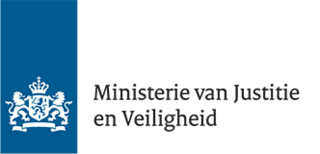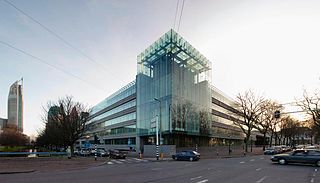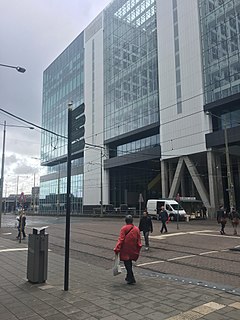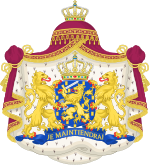
The cabinet of the Netherlands is the main executive body of the Netherlands. The current cabinet of the Netherlands is the Fourth Rutte cabinet, which has been in power since 10 January 2022. It is headed by Prime Minister Mark Rutte and his deputies Sigrid Kaag, Wopke Hoekstra and Carola Schouten.

The Ministry of Health, Welfare and Sport is the Dutch Ministry responsible for public health, health care, quality of life, social work and sport. The Ministry was created in 1951 as the "Ministry of Social Affairs and Health" and had several name changes before it became the "Ministry of Health, Welfare and Sport" in 1994. The Ministry is headed by the Minister of Health, Welfare and Sport, currently Ernst Kuipers (D66), assisted by one State secretary, currently Maarten van Ooijen (CU).

The Ministry of Education, Culture and Science is the Dutch Ministry responsible for education, culture, science, research, gender equality and communications. The Ministry was created in 1918 as the Ministry of Education, Arts and Sciences and had several name changes before it became the Education, Culture and Science in 1994. The Ministry is headed by the Minister of Education, Culture and Science, currently Robbert Dijkgraaf

The Ministry of General Affairs is the Dutch Ministry responsible for government policy, planning, information, and the Dutch royal house. The Ministry was created in 1937 and dissolved in 1945, but in 1947 it was reinstated by Prime Minister Louis Beel. The Ministry remained small until 1967, when it was greatly expanded by Prime Minister Piet de Jong. Since his premiership the Ministry has continued to expand to the present day. The Minister of General Affairs is the head of the Ministry who is also Prime Minister and a member of the Cabinet of the Netherlands. The current Minister and Prime Minister is Mark Rutte.

The Ministry of Justice and Security is the Dutch Ministry responsible for justice, imprisonment and public security. The Ministry was created in 1798 as the Department of Justice, before it became in 1876 the Ministry of Justice. In 2010, it took over the public safety duties from the Ministry of the Interior and Kingdom Relations and became Ministry of Security and Justice. In 2017 the Ministry was renamed to Ministry of Justice and Security. The Ministry is headed by the Minister of Justice and Security, Dilan Yeṣilgöz-Zegerius (VVD) since 10 Januari 2022.

The Ministry of the Interior and Kingdom Relations is the Netherlands' ministry responsible for domestic policy, civil service, public administration, elections, local governments, intelligence, and kingdom relations.

The Ministry of Foreign Affairs is the Netherlands' ministry responsible for foreign relations, foreign policy, international development, international trade, diaspora and matters dealing with the European Union, NATO and the Benelux Union. The ministry was created in 1798, as the Department of Foreign Affairs of the Batavian Republic. In 1876, it became the Ministry of Foreign Affairs.

The Ministry of Defence is the Dutch Ministry responsible for the armed forces of the Netherlands and Veterans Affairs. The Ministry was created in 1813 as the "Ministry of War" and in 1928 was combined with the "Ministry of the Navy". After World War II in the ministries were separated again, in this period the Minister of War and Minister of the Navy were often the same person and the State secretary for the Navy was responsible for daily affairs of the Royal Dutch Navy. In 1959 the ministries were merged. The Ministry is headed by the Minister of Defence, currently Kajsa Ollongren, assisted by the Chief of the Defence of the Netherlands, Onno Eichelsheim since April 2021.

The Ministry of Finance is the Dutch Ministry responsible for economic policy, monetary policy, fiscal policy, tax policy, incomes policy, financial regulation, the government budget and the financial market. The Ministry was created in 1798 as the Department of Finance of the Batavian Republic. It became the Ministry of Finance in 1876. The Minister of Finance is the head of the Ministry and a member of the Cabinet of the Netherlands. The current Minister is Sigrid Kaag.
The FPS Employment, Labour and Social Dialogue, more commonly referred to as the FPS Employment or the FPS Labour, is a Federal Public Service of Belgium. It was created by Royal Order on February 3, 2002, as part of the plans of the Verhofstadt I Government to modernise the federal administration. It is responsible for managing labour relations, ensuring the protection and promotion of occupational well-being, and participating in the development of social legislation.
In the Netherlands the Ministers without portfolio are Dutch ministers that does not head a specific ministry, but assumes the same power and responsibilities as a minister that does. The minister is responsible for a specific part of another minister's policy field. In that sense, a minister without portfolio is comparable to a State Secretary (staatssecretaris) a junior minister in Dutch politics, who also falls under another ministry and is responsible for a specific part of that minister's policy field. However, one distinct difference is that a minister without portfolio is a member of the Council of Ministers and can vote in it, whereas a state secretary is not. The minister for development cooperation has always been a minister without portfolio.

The Tax and Customs Administration is the tax collection and customs service of the government of the Netherlands. It is part of the Ministry of Finance and is responsible for levying and collecting taxes in the Netherlands.

The Ministry of Economic Affairs and Climate Policy is the Netherlands' ministry responsible for international trade, commercial, industrial, investment, technology, energy, nuclear, renewable energy, environmental, climate change, natural resource, mining, space policy, as well as tourism.

The Ministry of Infrastructure and Water Management is the Dutch Ministry responsible for transport, aviation, housing policy, public works, spatial planning, land management and water resource management. The Ministry was created in 2010 as the Ministry of Infrastructure and the Environment following the merger of the Ministry of Transport and Water Management and the Ministry of Housing, Spatial Planning and Environment. In 2017, the Ministry was renamed the Ministry of Infrastructure and Water Management and the responsibilities for environmental policy and climate change policy were transferred to the Ministry of Economic Affairs.

The Ministry of Labour and Social Economy is the department of the Government of Spain responsible for planning and carrying out the government policy on labour relations and social economy.

The Ministry of Human Resources, abbreviated MOHR, is a ministry of the Government of Malaysia that is responsible for skills development, labour, occupational safety and health, trade unions, industrial relations, industrial court, labour market information and analysis, social security.
The Central Bureau of Statistics of Aruba, is in charge of the collection, processing and publication of statistics and reports to the Minister charged with responsibility for the subject of Statistics. It was created mainly to facilitate the development of a statistical system for Aruba which is also a component of the CARICOM regional statistical system together with other member countries of this regional institution.
Luc Sels is a Belgian sociologist.














